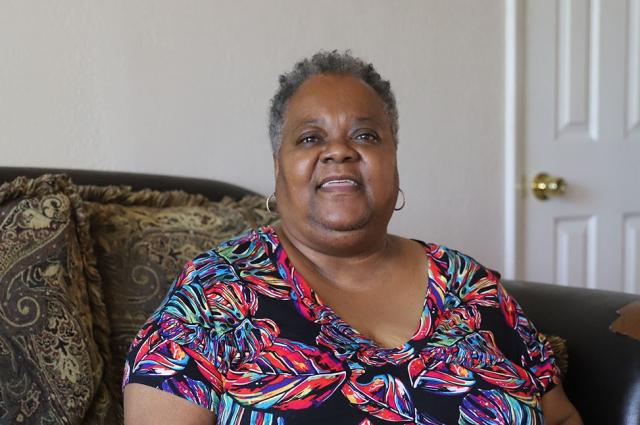
Elated to be vaccinated: Senior gets a shot shortly after calling 211
CINCINNATI, Ohio (August 5, 2021) — She coughed persistently and felt short of breath. In December 2020, 66-year-old Angie Rush was diagnosed with COVID-19. She later learned that everyone in her four-unit Golf Manor apartment building had the disease.
“I had a bad journey, and the Lord took me and made me well,” Rush says. “But I was just so afraid to get it again. I was so nervous after going through that. I just wanted a shot so bad.”
Because she has underlying medical conditions, she worried that a second bout with COVID would be worse than the first. She desperately wanted to be vaccinated as soon as possible. But she doesn’t own a smartphone or use the internet, so her landline was her only way to register for a shot.
“It was so hard. I called the (Cincinnati) Health Department and they told me to call the Hamilton County Health Department. I called every single place, every single day, and kept trying. Even when (registrations) got to my age group, I heard a recording saying the list is full.” A January spike in COVID cases in Hamilton Country added to her anxiety.
Then one day Rush asked the woman who was helping her to renew Medicaid benefits whether she knew of a better alternative for vaccine registration. She told Rush to call United Way’s 211 helpline.
Early in the pandemic, United Way positioned 211 as a one-stop shop for COVID-19 relief. As vaccines became available, United Way’s focus turned to seniors, many of whom faced technological barriers that made it difficult for them to navigate vaccine resources.
By calling 211, seniors could talk to a live person. They could learn about available vaccine providers. Eventually, they could get help scheduling a shot.
Acting on its commitment to equity and inclusion, United Way also made special efforts to assist communities disproportionately affected by COVID. Blacks were being infected at a higher rate than whites and were twice as likely to die. To meet those needs, United Way reached out to nontraditional partners — predominately Black churches — and offered to schedule vaccinations for people age 65 and up.
Rush is Black and formerly lived in Mount Auburn, a few blocks from United Way’s Reading Road building. But she acknowledges that when she called 211, she knew little about the organization’s work. She spoke to a United Way call specialist named Anna.
“She said she would sign me up,” Rush says. “She called me right back and told me they were giving shots at Mercy Health – West Hospital.” Anna scheduled an appointment for Rush, and in late February, less than a week after calling 211, she got her first shot.
“I was so happy and felt so good,” Rush says.
So, good, in fact, that she called 211 again and left a message for Anna. “I wanted her to know how much I appreciated United Way and her helping me, because I had been trying hard to get a shot.
“I’ll never forget your number — 211. So simple.”